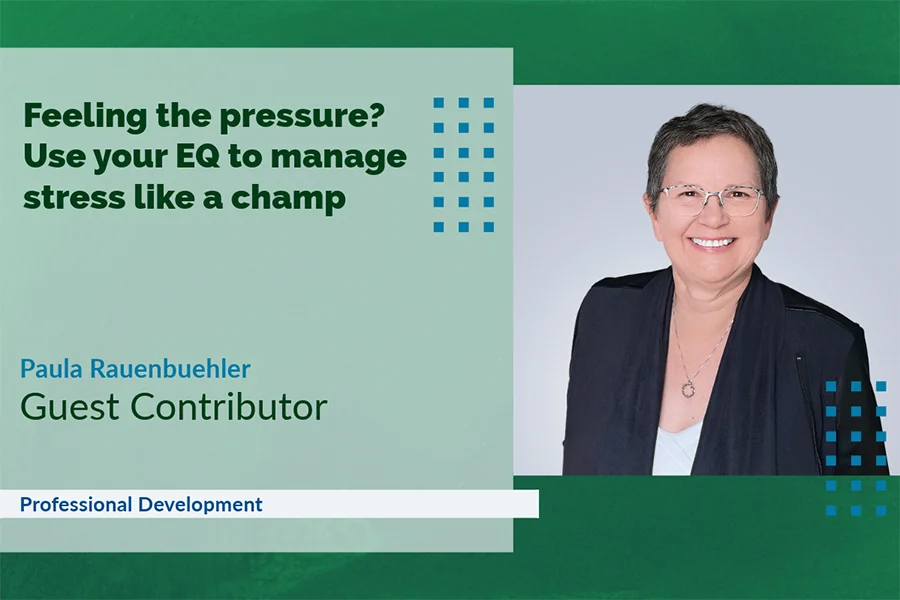
May 14, 2024
Life throws curveballs, right?
Deadlines loom, relationships get strained and sometimes it can feel like everything’s spinning out of control.
That’s where stress comes in, like a shadow we can’t quite shake.
But here’s the good news: We’re not powerless against it.
We have a secret weapon – our emotional intelligence (EQ).
My work with clients helps them navigate these moments by building their emotional EQ.
We focus on self-awareness, communication and empathy, giving them the tools to step back, assess the situation calmly and choose their next move with intention.
As they hone their EQ, they find themselves emerging from stressful situations with a newfound sense of control.
Think of EQ as your inner toolbox for dealing with stress.
It’s not about magically making problems disappear, but about building resilience to navigate them with more clarity and control.
So, let’s unpack some key tools from this toolbox:
Flexibility: Go with the flow
We often get stressed because we cling to rigid expectations.
When reality throws a wrench in our plans, frustration explodes.
Flexibility, a core part of EQ, helps us adapt our thoughts, emotions and actions to changing situations.
It’s about rolling with the punches and acknowledging that life rarely goes according to our perfect script.
Imagine that work throws a sudden project deadline at you.
Panic might be the first reaction, but a flexible approach involves reassessing the situation, prioritizing tasks and even asking for help.
This adaptability reduces the emotional strain of holding onto an inflexible ideal.
Stress tolerance: Building your inner strength
Stress tolerance is like your internal stress shield.
It’s about being able to function effectively even when the pressures are on.
It doesn’t mean being immune to stress, but rather having the tools to manage its impact.
It’s like a tightrope walker – they experience the stress of being high up, but they maintain focus and composure.
Similarly, cultivating stress tolerance allows us to acknowledge the stress while staying grounded, preventing it from overwhelming us.
Optimism: Finding the silver lining
Let’s face it, a positive outlook goes a long way.
Optimism, the ability to see the bright side even when things are tough, is a powerful stress management tool.
It doesn’t mean ignoring challenges, but rather viewing them as temporary setbacks rather than insurmountable roadblocks.
This positive perspective fuels our hope and motivation, helping us persevere through tough times.
Think about a job interview.
Anxiety is natural, but an optimistic mindset allows you to focus on your strengths and the potential opportunities the interview presents.
This positive outlook reduces the paralyzing effects of stress and allows you to perform at your best.
Problem-solving, reality testing: Tools for clarity
Effective stress management requires a two-pronged attack – solving problems and seeing things clearly.
Problem-solving, a crucial EQ skill, equips us with the tools to address the root causes of our stress.
It involves identifying the source of stress, brainstorming solutions and implementing effective strategies.
Imagine facing financial difficulties.
Ignoring the problem won’t make it disappear.
However, by actively analyzing your finances, creating a budget and exploring solutions like additional income streams, you take control of the situation, reducing the stress associated with it.
Reality testing, another key skill, involves grounding ourselves in the present moment.
It’s about separating our emotional reactions from the objective facts of the situation.
This allows us to avoid catastrophizing and make informed decisions based on a clear understanding of what’s happening.
Think about receiving a negative performance review.
While the initial reaction might be anger or self-doubt, reality testing involves objectively assessing the feedback, identifying areas for improvement and initiating constructive dialogue with your manager.
This grounded approach reduces emotional turmoil and allows for a productive response.
Empathy: Connecting and diffusing tension
Stress often manifests in interpersonal conflict.
Empathy, the ability to understand and share the feelings of others, plays a crucial role in managing these situations effectively.
By actively listening and acknowledging the perspectives of others, we can de-escalate tension and foster understanding.
Imagine a heated argument with a loved one.
Instead of reacting defensively, empathy allows you to see the situation from their perspective, validate their feelings and work toward a solution that addresses both your needs.
This empathic approach fosters connection and reduces the stress associated with conflict.
Emotional expression: Letting your feelings out
Bottling up emotions is a recipe for stress overload.
Emotional expression, the ability to share your feelings healthily, acts as a pressure release valve.
By communicating your emotions openly and honestly, you create space for understanding and support from others.
Imagine feeling overwhelmed by work pressure.
Instead of internalizing your stress, expressing it to a trusted friend or colleague allows you to gain perspective, receive support and potentially brainstorm solutions together.
This open communication fosters emotional well-being and reduces the burden of stress.
Emotional self-awareness: Knowing yourself
The foundation of effective stress management lies in emotional self-awareness – the ability to recognize and understand your own emotions.
This self-awareness allows you to identify the triggers that lead to stress and develop strategies to manage them effectively.
You can find a variety of resources to explore the more than 150 emotions we might experience on the internet.
Imagine feeling a surge of anxiety before a presentation.
By recognizing this emotional response, you can identify the underlying fear of public speaking and implement strategies like deep breathing exercises or visualization to manage your anxiety.
This self-awareness can empower you to take control of your emotional state and prevent stress from spiraling out of control.
Self-actualization: Reaching your full potential
Stress can often lead to feelings of stagnation and a sense of unfulfilled potential. Self-actualization, the drive to grow and achieve your goals, acts as a powerful antidote to this negativity.
By setting meaningful goals and actively working toward them, you can create a sense of purpose and control over your life, reducing the stress associated with feeling lost or unfulfilled.
Imagine feeling stuck in a dead-end job.
By identifying your strengths and aspirations, setting career goals and actively pursuing opportunities for advancement, you can create a path toward personal fulfillment.
This sense of progress and purpose can reduce the stress associated with feeling stagnant and unfulfilled.
Powerful toolkit
Remember, emotional intelligence is a muscle that needs to be exercised.
Also, remember that you can over train as much as you can use too little of these aspects.
By actively and strategically cultivating these core elements, you can equip yourself with a powerful toolkit to navigate the inevitable storms of stress.
It’s a journey of self-discovery, a continuous process of learning to understand and manage your emotions, leading to a more resilient and fulfilling life.
 Empower innovation and advance industry leadership
Empower innovation and advance industry leadership Making a Difference: NFL Fan of the Year Tom Grossi uses platform to give back
Making a Difference: NFL Fan of the Year Tom Grossi uses platform to give back






